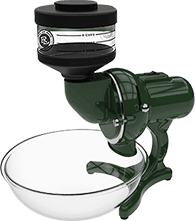For many Americans, the busyness of our lives keeps us moving but not exercising, eating fast instead of healthy, and generally not taking as good of care of ourselves as we should. When we consider making a change, it may seem impossible because there’s just “no time.” Unfortunately, if we don’t change, it will catch up with us.
Cardiovascular disease (including heart disease, stroke and others) is the number one cause of death in the United States, affecting approximately 1 million lives annually. As severe as that is, there are preventative measures that can help you reduce your risk and boost your heart health.
Diet is one component of an overall plan, and in that, whole grains play an important role. Here’s why:
- Whole grains lower each of the following: cholesterol, low-density lipoprotein, and triglycerides.
- A Harvard study showed that women who ate 2 to 3 servings of whole grain products each day were 30% less likely to have a heart attack over a 10 year period than women who ate less than 1 serving per week.
- The American Heart Association reports that dietary fiber from whole grains may help improve blood cholesterol levels and lower risk of heart disease, stroke, obesity and type-2 diabetes.
Where to start?
First, remove refined flour and related products from your grocery list. Replace them with whole grain options, if available. You may find that some of your food options don’t have alternatives, or that the cost of them is prohibitive. This is where you can make the important and life-changing decision to start making more of your own food. In general, making your own food and ingredients from scratch is the most economical and healthy route to take.
Some whole grains, like quinoa and buckwheat, can be used as is, without milling them into flour. Between soups and salad toppings, whole grains can be included into your meals with minimal prep and cooking time. With milling, you can grind only how much you need, when you need it, giving you a far superior nutritional product in minutes. And the taste difference will be pleasantly notable. Your food will have a much broader flavor than the commercial pre-packaged food you once ate. Instead of being concerned about the time involved, you’ll wonder why you didn’t start making your own food sooner.
Adding whole, healthy grains to your diet is really simple, and considering the impact they can have on your heart and overall health, it’s essential. Start adding great taste to your food and nutrition for your heart with whole grains today. Here are some recipes for getting started:
References:
http://www.theheartfoundation.org/heart-disease-facts/heart-disease-statistics/

